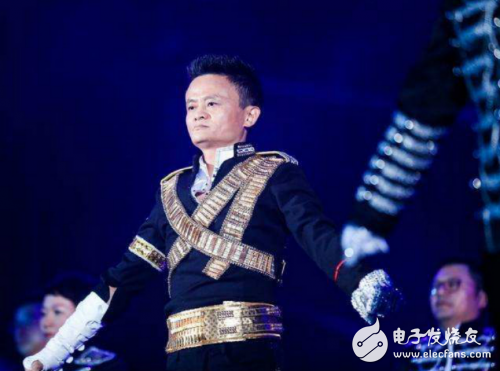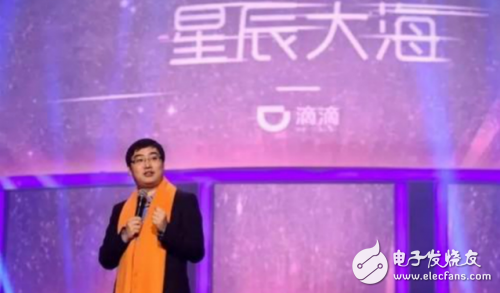Since the Spring Festival in 2018, companies have also ended their annual meeting. It must be said that this year's annual meeting is really a lot of things to watch. Mo Mo has smashed the circle of friends by the top of the participants with the iPhone X; Ma Huateng appeared at the annual meeting of Tencent Beijing Branch, turned into a hip-hop boy, and deeply sang the hip-hop song "At least you"; Ma Yun is in At the annual meeting, a prince costume, imitating Michael Jackson's dance...
In addition to having fun, the Internet has not forgotten the business, they all gave a wonderful speech at the annual meeting, not forgetting to review the results of 2017, and set a new strategy for 2018.
At the beginning of the new year, let's take a look at what new trends Internet companies will have in 2018.
Alibaba: Globalization of 2018Ali's annual meeting came extraordinarily early. On the evening of September 8, 2017, the 18th anniversary of Alibaba Group was held at Hangzhou Huanglong Sports Center.

For Ma Yun, the growing Alibaba is more like his child, from 18 partners to nearly 60,000 employees worldwide. At this special adult ceremony, Ma Yun reviewed Alibaba's past 18 years, summed up the present and looking forward to the future.
Ma Yun mentioned that in terms of scale, Alibaba is already the 21st largest economy in the world, with a total of 54,421 employees, from 70 different countries, and has its own offices in 21 countries and regions.
In 2017, Alibaba proposed “new retail, new manufacturing, new finance, new technology, new energy†or “five new strategy†strategy. At the same time, in order to serve the five new†strategy, the reappointment of several senior executives And the rotation is in order to bring strong execution with the escalating and efficient organization. Inward, Ali is divided into two parts: “small front desk, big middle and middle stageâ€, comprehensive reform and upgrading of Ali retail platform, cloud computing, Ali mother. The comprehensive and independent development of emerging businesses such as rookies and so on has begun.
In Ma Yun’s annual speech, we also saw his expectations for 2018:
1. In the future, Alibaba will fully invest in globalization and actively promote globalization. "We must look at the issue from a global perspective. We must use global capabilities to integrate resources from all sides to solve the problems of society and the future of the world."
2. Alibaba will strengthen its investment in rural development and is committed to poverty alleviation. As we all know, at the end of 2017, Alibaba’s 36 partners collectively made a public appearance and officially launched the Alibaba Poverty Alleviation Fund. Ma Yun said at the annual meeting: "We will go all out and invest in rural development at all costs. Technology should not be the driving force for the gap between the rich and the poor. The technology is a complete, thorough and more The things shared by Pratt & Whitney must allow all human beings to share such technology."
3. Alibaba will further increase its investment in technology and innovation in technology. Ma Yun said: "In the next 5 to 10 years, we are not going to surpass anyone, nor do we want to be the top three in the world, but we must solve problems for the future, for small and medium-sized enterprises, for young people, for us to make the world difficult." The promise of business is going to be put into action."
Didi: "Tai Chi Strategy" pays attention to internal and external repair, multi-line layout, steady progressDidi received $5.5 billion in financing at the end of April 2017, with a post-mortem valuation of $50 billion. According to internal data, the GMV of Didi reached US$25 to US$27 billion in 2017. In 2017, GMV increased by more than 70% and was basically profitable. However, the 2017 Drip is a very low-key, and the limelight has been robbed by shared bicycles and unattended shelves.

Di Di's CEO, Cheng Wei, gave a speech at the annual meeting, saying that 2017 is a year of dripping, and that this year is "squatting down" in order to better "jump up".
In his summary, we can see that Didi invested a huge amount of funds and technical resources to build a more complete technology security system in 2017, the safety accident rate dropped by 21%, and laid out in the field of smart transportation.
In addition, he said: "In 2017, we have made great strides in the construction of automobile asset management, auto finance services, maintenance services, and charging networks. The refueling business has achieved great breakthroughs."
When talking about the future, Cheng Wei first revealed the "Tai Chi strategy" of Didi, saying that both internal and external repair, multi-line layout, and steady progress are the key to the development of Dijia in 2018.
First of all, Didi will build a one-stop travel platform around the passengers, go global, and become a travel assistant of artificial intelligence; the flood surface will surface, and the drip will enter the line to create a one-stop service platform around the owner, and eventually become a shared car. Operators; AI for TransportaTIon (AI changed traffic), continued to strengthen investment in smart transportation and driverless, and eventually became a leader in smart transportation technology. "In 2018, we hope to win the domestic and foreign global battles through the optimization of internal power, and also our mission and our vision for the next stage."
Secondly, Didi will be around the owner and passengers, and each business will be absolutely leading in the segmentation track.
At the same time, Didi is still entering more fields, trying to be a car operator, hoping to push the car factory to share the design of the car for the future.
In order to cooperate with the implementation of Taiji strategy, Didi has two adjustments in organization in 2018: First, with the third business group after the fast-moving business group and quality travel business group, Didi's Strategy Department, International The business division and the financial business division will be combined into a strategic business group. Second, Didi's intelligent transportation team will be transformed from smart transportation FT to smart transportation division.
Xiaomi: Countering the domestic market, preparing for the local victoryIf 2017 is a low-key year for Didi, it will be a year for Xiaomi. At the beginning of last year, Xiaomi released the self-developed mobile phone chip 澎湃S1 and successfully mass-produced it. In the third quarter of last year, Xiaomi released the full-screen 2.0 Xiaomi MIX2. In addition, Xiaomi also adopted a large and advanced intelligent hardware ecological chain layout and continuous investment. The cloud service has built a global IoT platform.
More importantly, in October 2017, Xiaomi achieved the goal of over 100 billion revenues at the beginning of the year. At present, Xiaomi has entered more than 70 countries and regions, and sales in the top 5 countries in 16 countries. Among them, from the third quarter of last year, Xiaomi ranked first in the market in India.
In 2018, Xiaomi’s strategic focus remains on innovation and quality. Xiaomi will make mobile phones around these two goals.
In terms of the market, Xiaomi will continue to vigorously explore overseas markets and launch counterattacks in the domestic market, preparing for the local finals in 2019. At the same time, Lei Jun proposed the goal of 2018: "In the 10 quarters, the domestic market will return to the first!"
Lei Jun said that Xiaomi should use the province as the unit, the city as the unit, the county, the township and even the community grid as the unit, and always maintain the bravery and fierceness in every part of the battlefield.
In order to achieve this goal, Xiaomi will train and promote a large number of young management cadres to build a more dynamic and more enterprising front-line command team at all levels.
Tencent: combing internal organizational structure and enhancing To B capabilitiesWhen Tencent held the 2017 annual staff meeting, Tencent’s Pony Ma Huateng, MarTIn Liu Chiping, Mark Renyu, and Allen Zhang Xiaolong all attended the meeting.
Ma Huateng is more concerned about Tencent's management problems. He said that the biggest problem facing Tencent is the internal organizational structure. Now Tencent needs more To B's ability to systematically sort out the internal structure from the inside to the outside.
Zhang Xiaolong talked about the next development of graduates and WeChat. He felt that graduates need to exercise more thicker at work, and WeChat's new exploration will still remain restrained.
Liu Chiping cares about how Tencent “empowersâ€. In his view, traditional advantage platforms need to find new ideas, train teams, and incubate new businesses.
Ren Yuxi talked about the current hot chicken game. He said that it is worthwhile to influence the online time because of respect for IP. The most important thing is to cultivate the habit of making original games.
WEB Management System is to access the management interface of the OLT through the IP address with a browser.
WEB (World Wide Web) is the global wide area network, also known as the World Wide Web. It is a global, dynamic interactive, cross-platform distributed graphics information system based on hypertext and HTTP. It is a network service built on the Internet. It provides a graphical, easy-to-access and intuitive interface for browsers to find and browse information on the Internet. The documents and hyperlinks in it organize the information nodes on the Internet into one for each other. Associated mesh structure.
In 1989, a team led by Tim Berners-Lee in CERN (European Institute of Particle Physics) submitted a new protocol for the Internet and a file system using the protocol. The team named this new system World Wide Web. The purpose is to enable scientists around the world to use the Internet to exchange their work documents.
This new system is designed to allow any user on the Internet to search and retrieve documents from the databases of many document service computers. At the end of 1990, the basic framework of this new system was developed and implemented on a computer in CERN. In 1991, the system was transplanted to other computer platforms and officially released.
Web Management,Network Device,Olt Device,Fttb Fttx Equipment
Shenzhen GL-COM Technology CO.,LTD. , https://www.szglcom.com